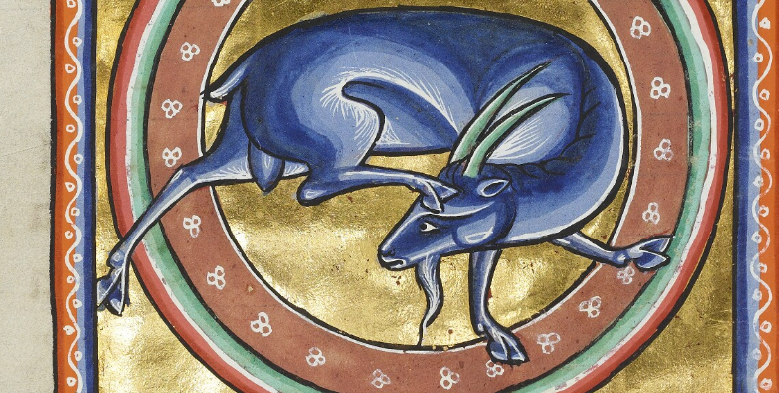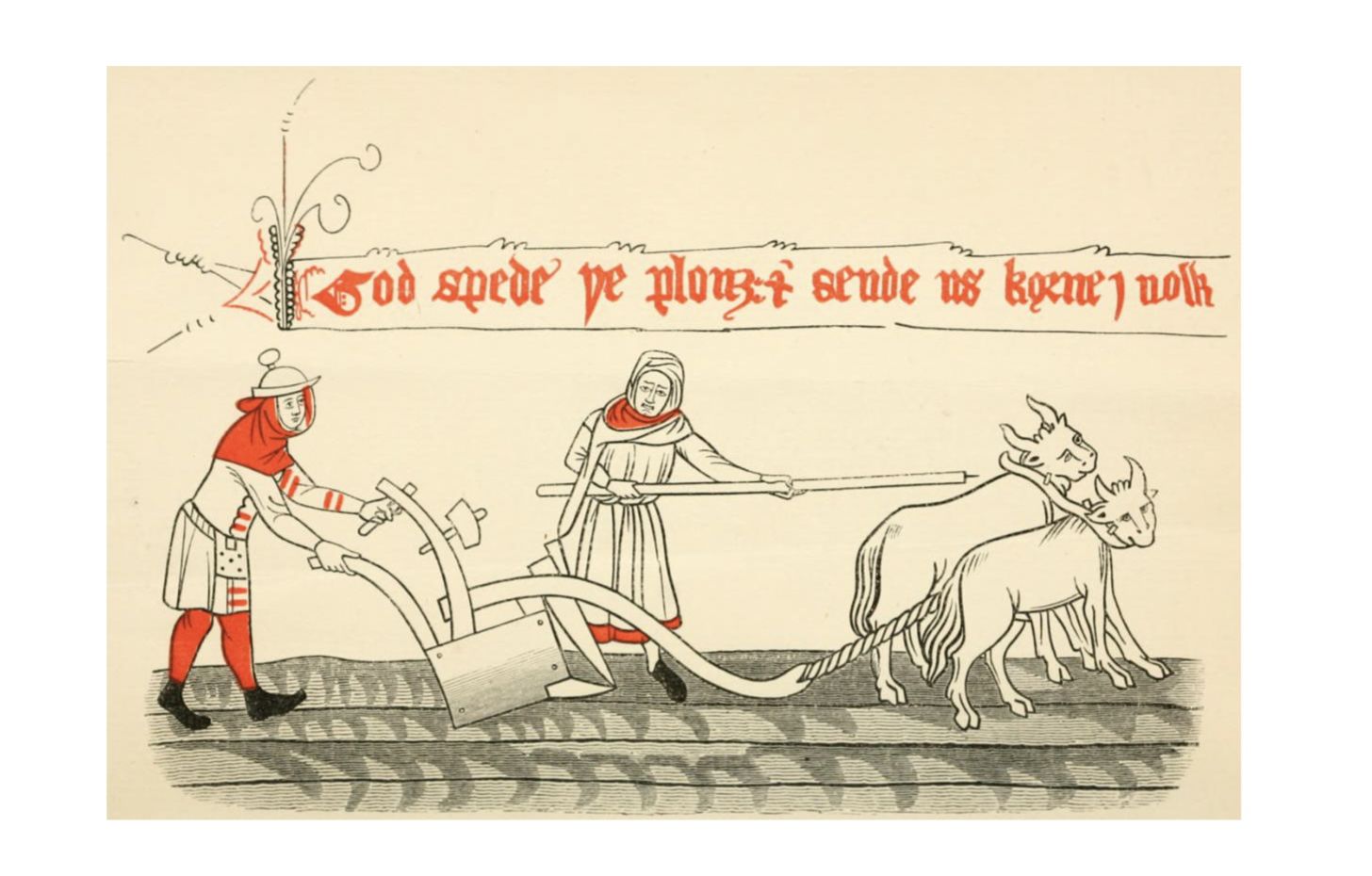It’s fifth week, the most notorious week in the Oxford term! If you are feeling the fifth week blues, you might perhaps be comforted by the fact that Spring will be arriving soon. The days are already getting longer, and we are enjoying more sunny days in Oxford. Here is Alcuin on the importance of Spring:
Cuculum, vernalem avem, vestrae direxi sanctitati cum munusculis parvitatis meae
[“I have sent your grace the cookoo, the bird of Spring, with some little gifts from me” Ep. 167]
Though I can’t bring you Spring right away, I can offer many little gifts in the form of a delightful schedule of weekly events! Please check the weekly listings below to chase those fiften week blues away:
ANNOUNCEMENTS:
- The Piers Plowman was a great success (cf. our new TikTok account for some clips!); the costumes are now part of the OMS stock and can be used by any group performing in the mystery cycle on 22 April. Contact Michael Angerer for any questions around the performance!
- The 54th Annual Spring Symposium in Byzantine Studies will be held on 17-19 March 2023, at Corpus Christi College & All Souls College, Oxford, on the theme of Material Religion in Byzantium and Beyond. The Symposium brings together Byzantine studies with a series of innovative approaches to the material nature and realities of religion – foregrounding the methodological, historical and archaeological problems of studying religion through visual and material culture. For more information, the Symposium programme and registration, please visit the Symposium website here.
- The Week 7 Medieval History Seminar coincides with a strike day (27th Feb), and will be CANCELLED. Prof Liesbeth van Houts will deliver the paper on the Empress Matilda in Michaelmas Term.
- The third Old Frisian Summer School will take place from 9-16th July in St Edmund Hall. After the in-person edition in 2019 and the online edition 2021, the third edition will be a hybrid event. We still hope as many students and early career researchers will be able to attend in person, but the hybrid part should enable students and scholars around the world to take part. There will also be a taster session with Johanneke Sytsema in week 7: Friday, 3 March 2023, 3–4pm in 47 Wellington Square, 1st floor, lecture room 1: Johanneke Sytsema: Old Frisian and its place among the Germanic Languages. For more information please see the OFSS website.
EVENTS THIS WEEK:
Monday 13th February:
- The Byzantine Graduate Seminar takes place at 12.30-2pm online via Zoom. This week’s speaker will be Nathan D. C. Websdale (University of Oxford), The Humbled Generation: Racial Otherization and Ethnic Contraction in Byzantium in the Witnesses of the Fourth Crusade. To register, please contact the organiser at james.cogbill@worc.ox.ac.uk.
- The Medieval Latin Manuscript Reading Group led by Matthew Holford and Andrew Dunning is meeting as usual via Teams from 1-2pm. We will start with natural history from a medieval encyclopaedia. Sign up for the mailing list to receive updates and the Teams invite, or contact matthew.holford@bodleian.ox.ac.uk or andrew.dunning@bodleian.ox.ac.uk for more information.
- The Seminar in Manuscript Studies and Palaeography will take place at 2.15-3.45pm, in the Weston Library, Horton Room. This week’s speaker will be Sonja Drimmer (University of Massachusetts Amherst): “The ‘Genealogy Industry’: Codicological Diversity in England, c.1400–c.1500.” For further information contact matthew.holford@bodleian.ox.ac.uk or andrew.dunning@bodleian.ox.ac.uk.
- The Medieval History Seminar takes place at 5pm in the Wharton Room, All Souls College. This week’s speaker will be Ingrid Ivarsen (Cambridge), ‘Law in the late seventh century: the case of Theodore, Hlothhere, Wihtræd and Ine‘. (You may also attend remotely, Teams link here: or log in to Teams with your .ox.ac.uk account and join the group “Medieval History Research Seminar”, team code rmppucs. If you have any difficulties please email: medhistsem@history.ox.ac.uk ).
Tuesday 14th February:
- The Governability across the medieval globe Discussion Group is CANCELLED, in solidarity with UCU strike action.
- The Europe in the Later Middle Ages Seminar will take place at 2–3.30pm in the New Seminar Room, St John’s College. Tea and coffee available from 1.45pm. This week’s speaker will be Patrick Lantschner, UCL, ‘A Symbiotic Relationship? Cities and States in Europe and the Islamic World‘.
- The Medieval French Research Seminar will not take place, in solidarity with the UCU industrial action.
- The Medieval Church and Culture Seminar meets at 5-6pm in the Charlese Wellbeloved Room, Harris Manchester College. Paper starts at 5.15pm, with tea, coffee, biscuits and friendly Medievalist chat from 5pm! This week’s speaker will be Federica Gigante (History of Science Museum), ‘Islamic Spoils in a Christian Context: the reuse of Islamic textiles in Medieval Italian churches‘.
- The Carlyle Lectures in Medieval Law, with Prof. John Hudon (St Andrews) takes place at 5pm in South School, Examination Schools. This week’s lecture explores the ways in which deliberate legal change came to have unintended effects, especially on substantive law. It considers the interplay of legal learning, legal reasoning, and legal change. In so doing, it ponders Sir Henry Maine’s view of substantive law being secreted in the interstices of procedure. All are welcome.
Wednesday 15th February:
- The Medieval German Graduate Seminar will meet at 11:15am in the island room of Oriel College for discussing the prologue of this term’s text, Heinrich von Neustadt’s Apollonius von Tyrland. If you are interested to come along, contact Henrike Lähnemann, to be added to the teams chat.
- The Medieval Italian Seminar will take place at 2pm at Rees Davies Room, History Faculty. This week’s speaker will be Elena Rossi (Oxford, Magdalen), ‘The Entangled Nature of the University and Family Spheres in Medieval Bologna’.
- GLARE (Greek and Latin Reading Group) takes place at 4-5pm at Jesus College. Please meet at Jesus College Lodge. This week’s text will be Ovid, Fasti, 1.1–62. All welcome to attend any and all sessions. For more details and specific readings each week, or to be added to the mailing list, email john.colley@jesus.ox.ac.uk or jenyth.evans@seh.ox.ac.uk.
- The Medieval Latin Document Reading Group meets on Teams at 4-5pm. We are currently focusing on medieval documents from New College’s archive as part of the cataloguing work being carried out there, so there will be a variety of hands, dates and types. A document is sent out in advance but homework is not expected. Contact Michael Stansfield (michael.stansfield@new.ox.ac.uk) for further details and the Teams link.
- The Late Antique and Byzantine Seminar takes place at 5pm at the Ioannou Centre for Classical and Byzantine Studies, 66 St Giles. This week’s speaker will be Lilyana Yordanova (Ecole française d’Athènes), ‘In the name of the …lotus? Reinventing Christian monumental art and elite culture in the long 15th century’.
- The Medieval English Research Seminar takes place at 5.15pm in Lecture Theatre 2, English Faculty, followed by a drinks reception. This week’s speaker will be Mike Bintley (Birkbeck, University of London), ‘Beowulf’s Foliate Borders and the Surrounding Forest in Early Medieval England‘.
Thursday 16th February:
- The Early Medieval Britain and Ireland Network Hilary Term Lecture takes place at 1pm at Memorial Room, Worcester College. This term’s speaker is Jacqueline Nowakowski FSA, Director of the Tintagel Castle Archaeological Research Project, on behalf of the Cornwall Archaeological Unit and English Heritage. The paper will be ‘Cornwall in Late Antiquity: New Findings from the Tintagel Castle Excavations‘. For queries, please contact Meredith Cutrer (meredith.cutrer@worc.ox.ac.uk).
- The Centre for Gender, Identity, and Subjectivity (CGIS) is hosting a talk at 4pm in the History Faculty. The talk will be given by Jonas Roelens of the University of Ghent, titled “The young sodomite: Age and agency in sodomy cases in the late medieval Southern Low Countries”.
- The Seminar in Medieval and Renaissance Music will take place on Zoom at 5pm. This week’s speakers will be Martin Kirnbauer and the project team Vicentino21: Anne Smith, David Gallagher, Luigi Collarile and Johannes Keller (Schola Cantorum Basiliensis / FHNW), Soav’ e dolce – Nicola Vicentino’s Intervallic Vision. If you are planning to attend a seminar this term, please register using this form. For each seminar, those who have registered will receive an email with the Zoom invitation and any further materials a couple of days before the seminar. If you have questions, please just send an email to matthew.thomson@ucd.ie
- The Celtic Seminar will take place at 5.00pm via Zoom. This week’s speaker will be Nathan Abrams (Bangor), ‘Capturing and Preserving North Wales’ Jewish History?‘. Please contact a.elias@wales.ac.uk for the link.
Friday 17th February:
- The Medieval Coffee Morning meets as usual 10:30am in the Visiting Scholars Centre of the Weston Library with presentation of manuscripts from the collection. Watch here last week’s exciting presentation by Dr Thea Gomelauri on the layout of Hebrew Bibles.
- The Anglo-Norman Reading Group meets at 5-6.30pm at St Hilda’s College, in the Julia Mann Room. The text will be extracts from the Chronicle of Langtoft; pdf will be provided. For access to the text and further information, please email: stephanie.hathaway@gmail.com or jane.bliss@lmh.oxon.org.
- The Old Norse Reading Group meets at 5pm at The Royal Oak. Please email Ashley Castelino (ashley.castelino@lincoln.ox.ac.uk) to be added to the mailing list.
OPPORTUNITIES:
- CFP: Interfacing with linguistic norms, 323 BCE – 1453 CE: panel in Coimbra (14th Celtic Conference in Classics). This panel focuses on the use of linguistic norms in literature between Antiquity and the Middle Ages. From the idea of Hellenismos/Latinitas/ʿArabiyya until the development of the concept of ‘national language’, the promotion of language correctness and the imitation of canonical texts are elements of continuity in the endless compromise between norms and usage. Interested scholars are invited to submit abstracts of maximum 500 words by 20th February 2023 to the organisers (chiara.monaco@ugent.be; ugo.mondini93@gmail.com). For full details, see the blog post here.
- CFP: The Stanford-Berkeley English Graduate Conference 2023, Otherworlds. The Stanford-Berkeley English Graduate Conference seeks proposals for 20-minute papers that address any aspect of worldmaking in the context of otherness, alterity, subaltern studies, and literal other worlds, from any period, for a one-day conference, “Otherworlds,” to be held on April 22nd, 2023, in Stanford, CA, at Stanford University. The conference is open to any student currently enrolled in a graduate or undergraduate program in English or a related discipline. For full details, please see the full CFP here.
Of course, it is also Valentine’s day tomorrow, and it would be improper of me to leave you without an appropriate Alcuin quote on academic love:
quia semper te amabo, semper te ammonere no cessabo
[“I will always love you, and so will never cease to give you advice”, Ep. 42]May you give and receive kind advice this week! Of course, as your devoted news herald, I will never cease in providing weekly “advice”, but you are also served by the excellent graduate students Ashley Castelino, Eugenia Vorobeva, and Coral Kim, who are keeping the twitter and calendar updated with all of the latest updates on seminars, events, and strike action! Please remember to send them some love for their hard work, and to enjoy the fruits of their labours. I look forward to returning to your inboxes next week with even more gifts!

Ashmole Bestiary, Bodleian Library MS. Ashmole 1511, f. 20 r.
Viewable in full at Digital Bodleian
















